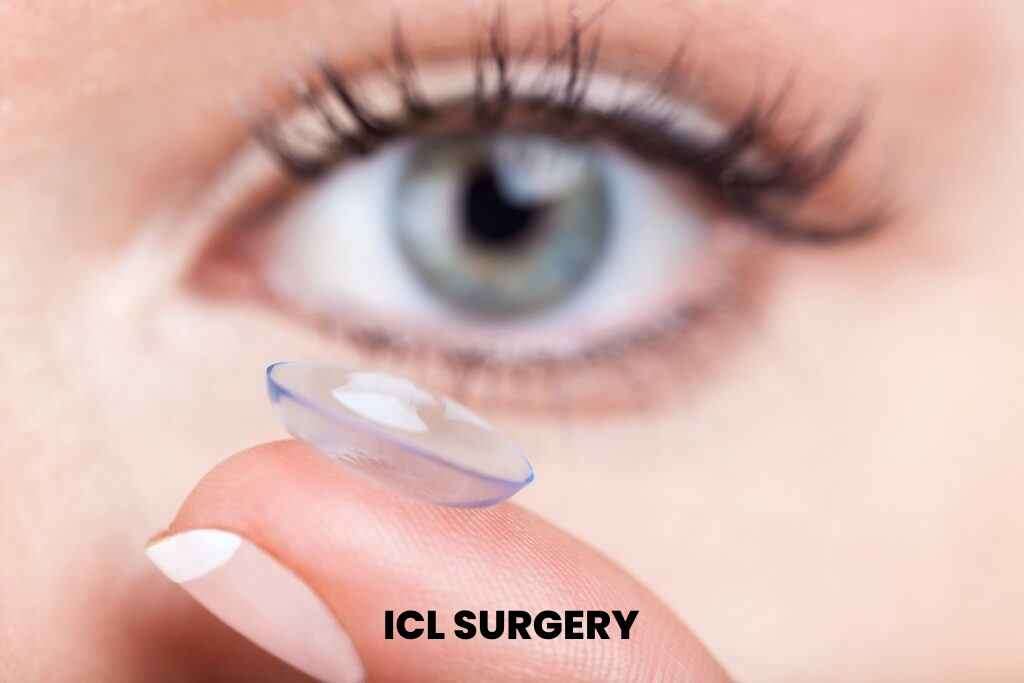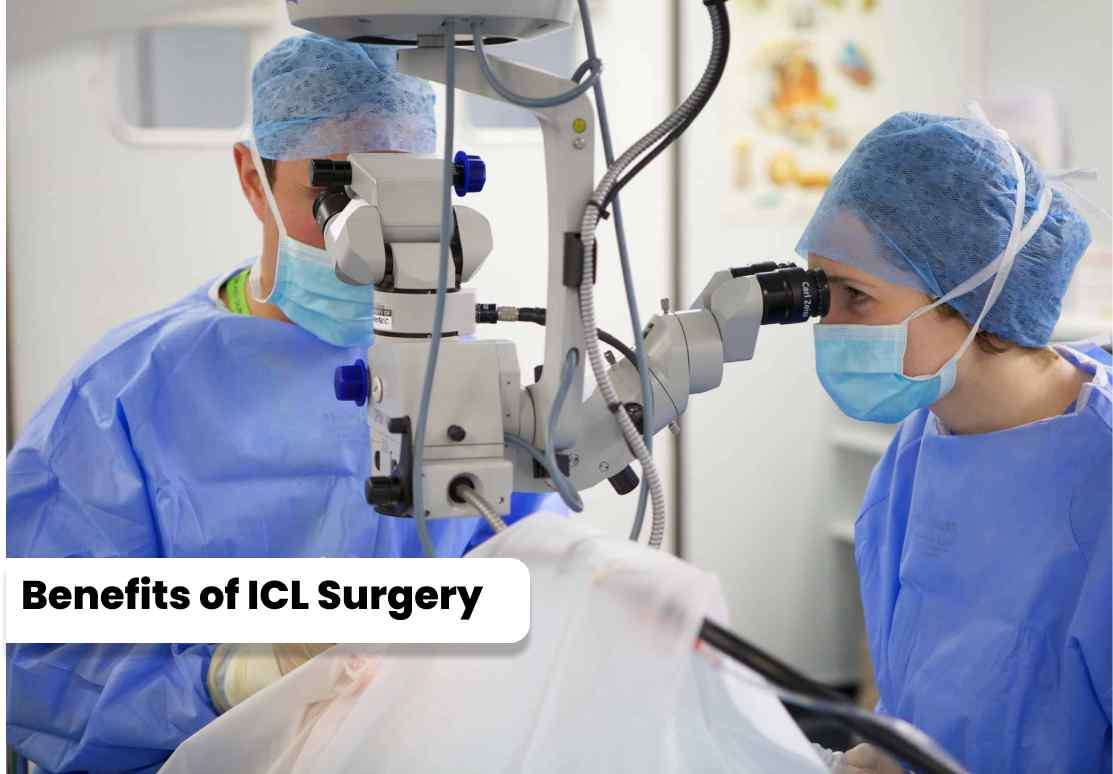ICL (Implantable Collamer Lens) surgery, also known as phakic
intraocular lens implantation, is a surgical procedure used to correct
refractive errors and provide an alternative to glasses or contact
lenses. Unlike LASIK or PRK, which reshape the cornea, ICL surgery
involves implanting a corrective lens inside the eye to improve vision.
Call us to book a appointment with the best eye specialist near you.
Implantable collamer lens (ICL) surgery, commonly Visian ICL, is a popular eye surgery for correcting myopia (shortsightedness) and astigmatism (irregularly shaped cornea). It eliminates dependence on glasses or contact lenses.

Implantable collamer lens (ICL) surgery, commonly Visian ICL, is a popular eye surgery for correcting myopia (shortsightedness) and astigmatism (irregularly shaped cornea). It eliminates dependence on glasses or contact lenses.
1. ICL Soft Lens A soft lens is just what the name implies. The lens is made from a polymeric material that bends easily. The design is similar to the collagen found in your cornea, so it poses less risk of an adverse reaction. 2. Intraocular Lens This type of ICL surgery is specifically designed for patients that donít meet the criteria for Lasik surgery because of severe nearsightedness. For this type of implant, a surgeon places the lens between the cornea and the iris so that your eyes can focus better.

1. ICL Soft Lens
A soft lens is just what the name implies. The lens is made from a polymeric material that bends easily. The design is similar to the collagen found in your cornea, so it poses less risk of an adverse reaction.
2. Intraocular Lens
This type of ICL surgery is specifically designed for patients that donít meet the criteria for Lasik surgery because of severe nearsightedness. For this type of implant, a surgeon places the lens between the cornea and the iris so that your eyes can focus better.
1. Glaucoma: If the ICL is oversized or isnít correctly positioned, it can increase pressure in your eye. This can lead to glaucoma. 2. Vision Loss: If you have high eye pressure for too long, you might experience vision loss. 3. Early Cataracts: An ICL can decrease the circulation of fluid in your eye, which increases your risk of cataracts: This might also happen if the ICL isnít sized properly or causes chronic inflammation. 4. Blurry Vision: Blurry vision is a symptom of cataracts and glaucoma. You might also have other visual problems, like glare or double vision, if the lens isnít the right size. 5. Cloudy Cornea: Eye surgery, along with age, reduces endothelial cells in your cornea. If the cells decrease too fast, you might develop a cloudy cornea and vision loss. 6. Retinal Detachment: Eye surgery also increases the risk of your retina detaching from its usual position. Itís a rare complication that requires emergency attention. 7. Eye Infection: This is also an uncommon side effect. It can result in permanent vision loss. 8. Additional Surgery: You may need another surgery to remove the lens and correct related issues.

1. Glaucoma: If the ICL is oversized or isnít correctly positioned, it can increase pressure in your eye. This can lead to glaucoma.
2. Vision Loss: If you have high eye pressure for too long, you might experience vision loss.
3. Early Cataracts: An ICL can decrease the circulation of fluid in your eye, which increases your risk of cataracts: This might also happen if the ICL isnít sized properly or causes chronic inflammation.
4. Blurry Vision: Blurry vision is a symptom of cataracts and glaucoma. You might also have other visual problems, like glare or double vision, if the lens isnít the right size.
5. Cloudy Cornea: Eye surgery, along with age, reduces endothelial cells in your cornea. If the cells decrease too fast, you might develop a cloudy cornea and vision loss.
6. Retinal Detachment: Eye surgery also increases the risk of your retina detaching from its usual position. Itís a rare complication that requires emergency attention.
7. Eye Infection: This is also an uncommon side effect. It can result in permanent vision loss.
8. Additional Surgery: You may need another surgery to remove the lens and correct related issues.
The lens is less likely to cause dry eyes, which is ideal if your eyes are chronically dry.
Itís meant to be permanent but can be removed.
The lens provides great night vision.
Recovery is usually quick because tissue isnít removed.
People who canít get laser eye surgery might be good candidates for ICL.

An ICL operation can be expensive, and the cost will depend on your treatment plan, it can be range between Rs. 80,000 to Rs. 1,45,000. Patients who choose the ICL should anticipate spending less money over the long term than they would if they continued to wear contact lenses or wear spectacles. Inquire with your doctor about any payment arrangements that may be offered for your ICL surgery (if applicable).
|
Serial No |
Hospital |
City |
|
1 |
Center For Sight |
New Delhi |
|
2 |
Apollo Hospitals |
Chennai |
|
3 |
Eye Q Hospital |
Gurgaon |
|
4 |
Fortis Memorial Research Institute |
Gurgaon |
|
5 |
Indraprastha Apollo Hospital |
New Delhi |
|
6 |
Kokilaben Dhirubhai Ambani Hospital |
Mumbai |
|
7 |
Medanta - The Medicity |
Gurgaon |
|
8 |
Apollo Gleneagles Hospital |
Kolkata |
|
9 |
Manipal Hospital |
Bangalore |
|
10 |
Apollo Hospitals |
Hyderabad |
Please Wait..